SSC211e Social Science Research: Approaches and Ethical Considerations
VerifiedAdded on 2023/06/08
|9
|2142
|400
Essay
AI Summary
This essay addresses several key aspects of social science research methods, focusing on the impact of long working hours on health, the main attributes of three major social research approaches (positivist, interpretive, and critical), and ethical considerations in designing a 'Working Hours Survey.' It analyzes the research presented by Saadan (2017) through a positivist lens, highlighting the relationship between long working hours and adverse health outcomes. The essay also discusses ethical challenges in conducting such surveys, including issues related to autonomy, beneficence, and the need for informed consent. The document concludes by emphasizing the importance of risk-benefit analysis in ensuring ethical research practices and minimizing potential harm to study participants. Desklib offers similar solved assignments and resources for students.
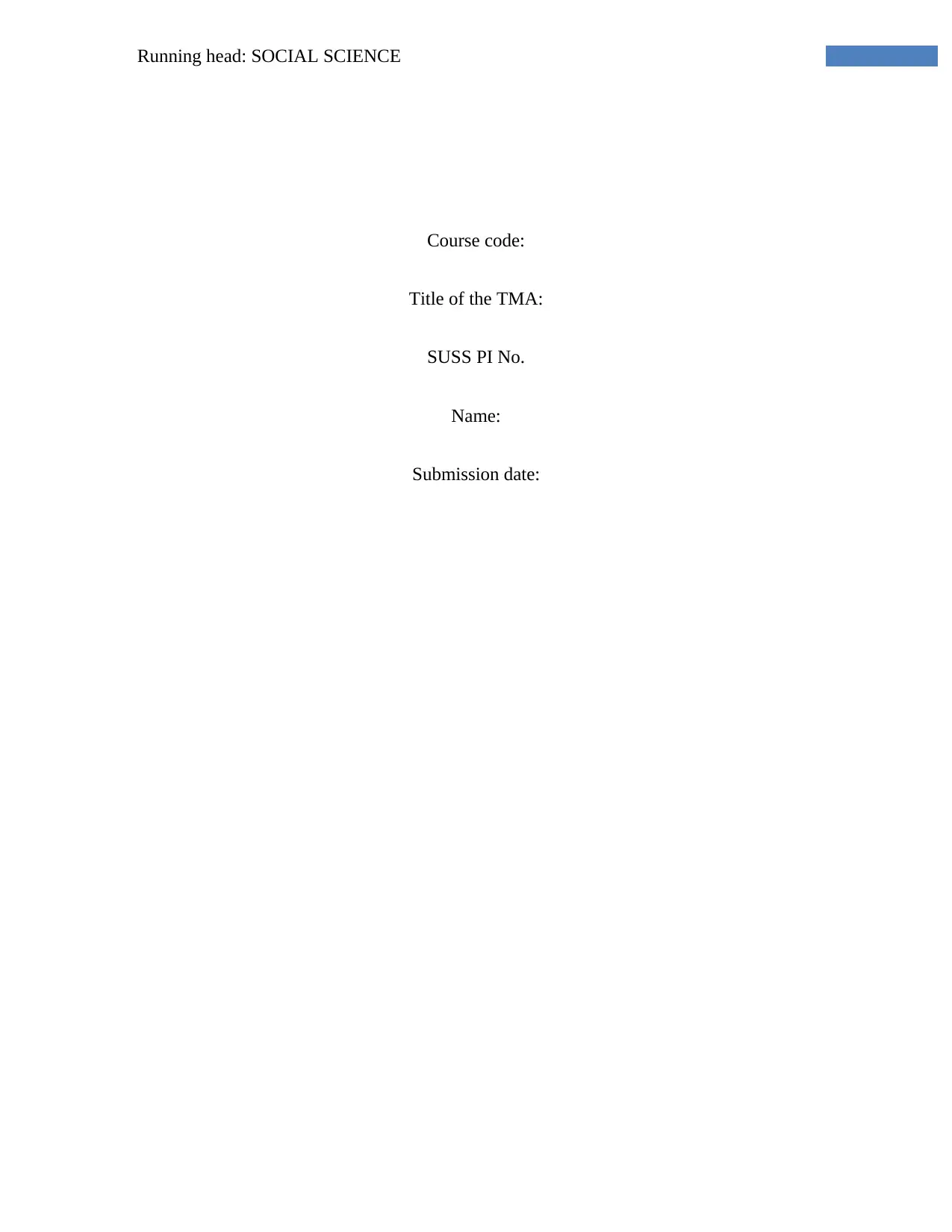
Running head: SOCIAL SCIENCE
Course code:
Title of the TMA:
SUSS PI No.
Name:
Submission date:
Course code:
Title of the TMA:
SUSS PI No.
Name:
Submission date:
Paraphrase This Document
Need a fresh take? Get an instant paraphrase of this document with our AI Paraphraser
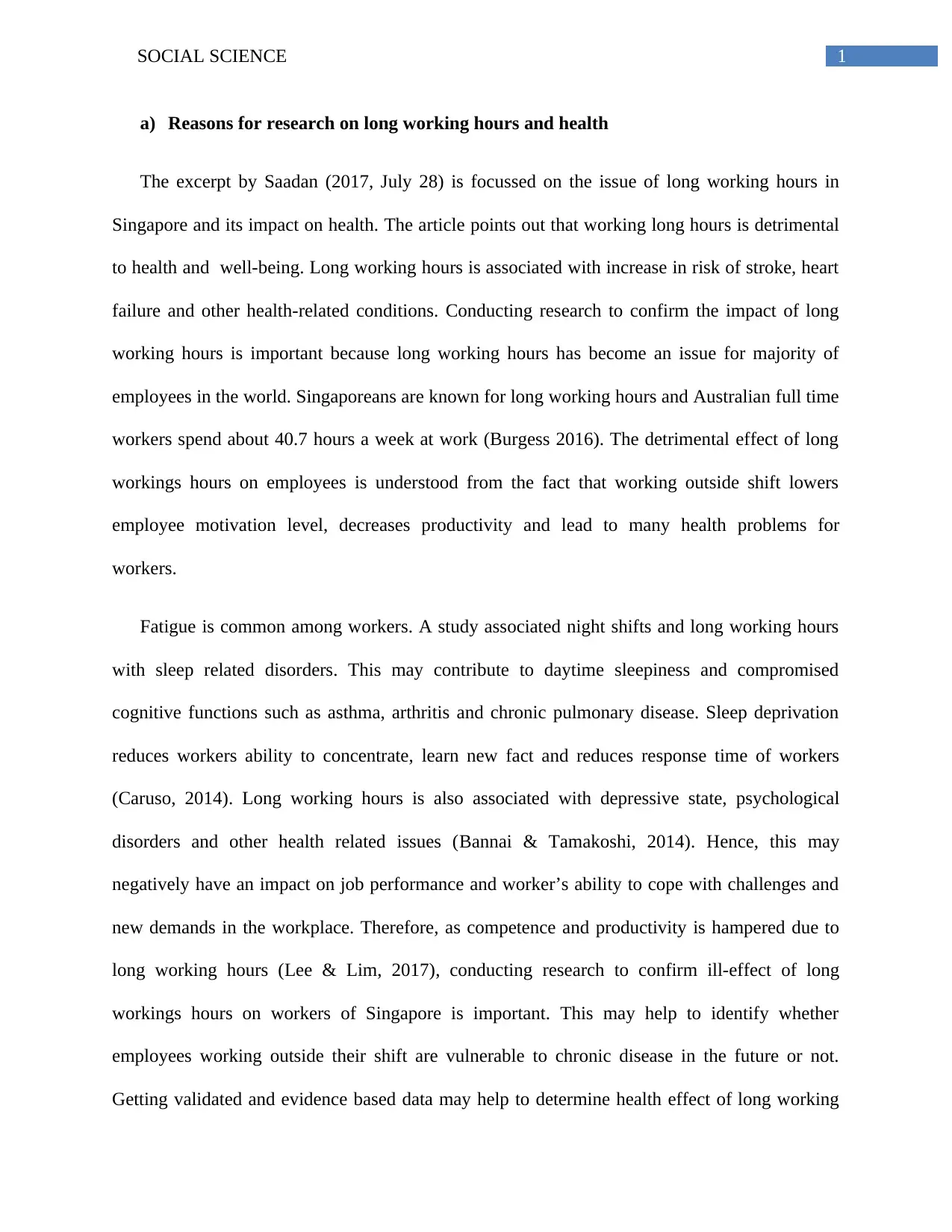
1SOCIAL SCIENCE
a) Reasons for research on long working hours and health
The excerpt by Saadan (2017, July 28) is focussed on the issue of long working hours in
Singapore and its impact on health. The article points out that working long hours is detrimental
to health and well-being. Long working hours is associated with increase in risk of stroke, heart
failure and other health-related conditions. Conducting research to confirm the impact of long
working hours is important because long working hours has become an issue for majority of
employees in the world. Singaporeans are known for long working hours and Australian full time
workers spend about 40.7 hours a week at work (Burgess 2016). The detrimental effect of long
workings hours on employees is understood from the fact that working outside shift lowers
employee motivation level, decreases productivity and lead to many health problems for
workers.
Fatigue is common among workers. A study associated night shifts and long working hours
with sleep related disorders. This may contribute to daytime sleepiness and compromised
cognitive functions such as asthma, arthritis and chronic pulmonary disease. Sleep deprivation
reduces workers ability to concentrate, learn new fact and reduces response time of workers
(Caruso, 2014). Long working hours is also associated with depressive state, psychological
disorders and other health related issues (Bannai & Tamakoshi, 2014). Hence, this may
negatively have an impact on job performance and worker’s ability to cope with challenges and
new demands in the workplace. Therefore, as competence and productivity is hampered due to
long working hours (Lee & Lim, 2017), conducting research to confirm ill-effect of long
workings hours on workers of Singapore is important. This may help to identify whether
employees working outside their shift are vulnerable to chronic disease in the future or not.
Getting validated and evidence based data may help to determine health effect of long working
a) Reasons for research on long working hours and health
The excerpt by Saadan (2017, July 28) is focussed on the issue of long working hours in
Singapore and its impact on health. The article points out that working long hours is detrimental
to health and well-being. Long working hours is associated with increase in risk of stroke, heart
failure and other health-related conditions. Conducting research to confirm the impact of long
working hours is important because long working hours has become an issue for majority of
employees in the world. Singaporeans are known for long working hours and Australian full time
workers spend about 40.7 hours a week at work (Burgess 2016). The detrimental effect of long
workings hours on employees is understood from the fact that working outside shift lowers
employee motivation level, decreases productivity and lead to many health problems for
workers.
Fatigue is common among workers. A study associated night shifts and long working hours
with sleep related disorders. This may contribute to daytime sleepiness and compromised
cognitive functions such as asthma, arthritis and chronic pulmonary disease. Sleep deprivation
reduces workers ability to concentrate, learn new fact and reduces response time of workers
(Caruso, 2014). Long working hours is also associated with depressive state, psychological
disorders and other health related issues (Bannai & Tamakoshi, 2014). Hence, this may
negatively have an impact on job performance and worker’s ability to cope with challenges and
new demands in the workplace. Therefore, as competence and productivity is hampered due to
long working hours (Lee & Lim, 2017), conducting research to confirm ill-effect of long
workings hours on workers of Singapore is important. This may help to identify whether
employees working outside their shift are vulnerable to chronic disease in the future or not.
Getting validated and evidence based data may help to determine health effect of long working
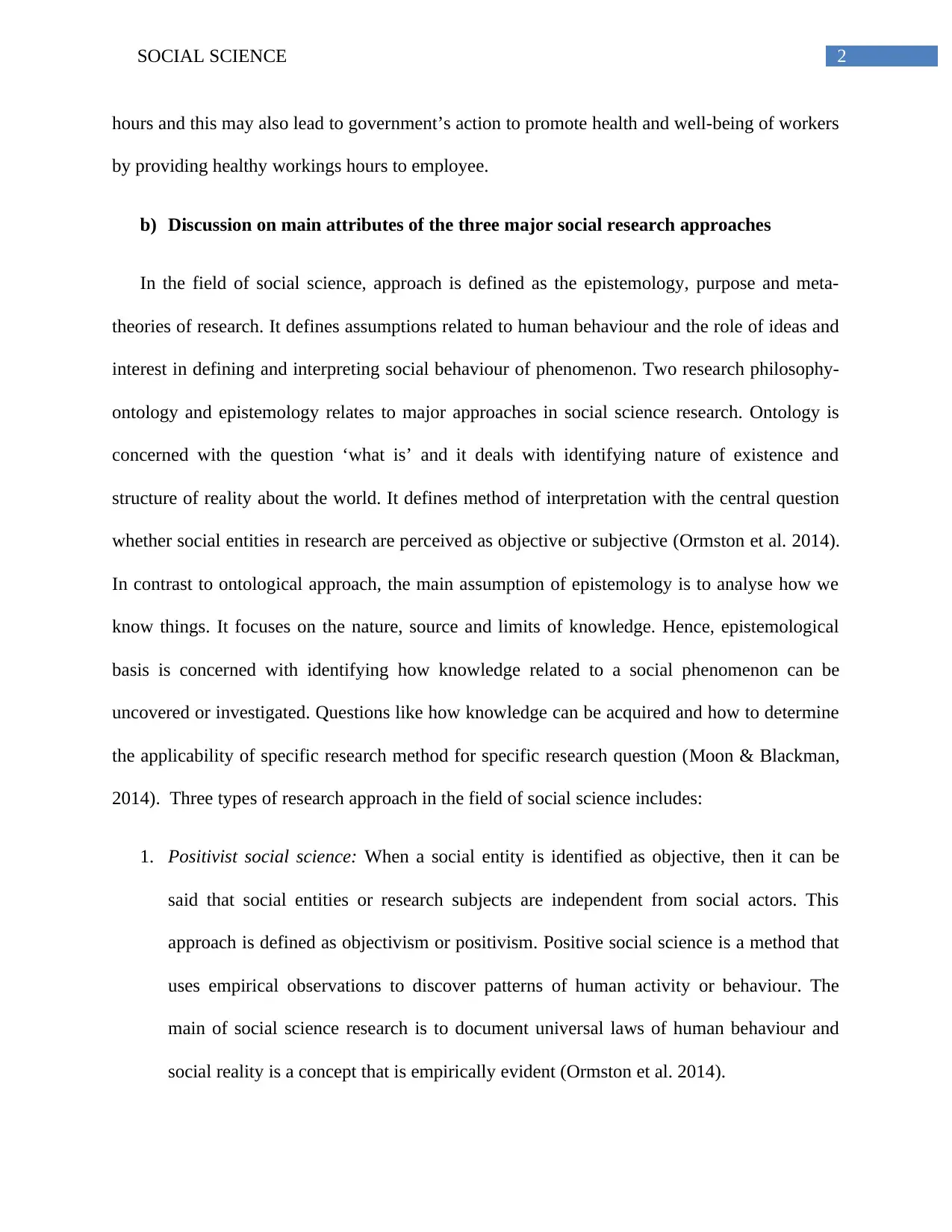
2SOCIAL SCIENCE
hours and this may also lead to government’s action to promote health and well-being of workers
by providing healthy workings hours to employee.
b) Discussion on main attributes of the three major social research approaches
In the field of social science, approach is defined as the epistemology, purpose and meta-
theories of research. It defines assumptions related to human behaviour and the role of ideas and
interest in defining and interpreting social behaviour of phenomenon. Two research philosophy-
ontology and epistemology relates to major approaches in social science research. Ontology is
concerned with the question ‘what is’ and it deals with identifying nature of existence and
structure of reality about the world. It defines method of interpretation with the central question
whether social entities in research are perceived as objective or subjective (Ormston et al. 2014).
In contrast to ontological approach, the main assumption of epistemology is to analyse how we
know things. It focuses on the nature, source and limits of knowledge. Hence, epistemological
basis is concerned with identifying how knowledge related to a social phenomenon can be
uncovered or investigated. Questions like how knowledge can be acquired and how to determine
the applicability of specific research method for specific research question (Moon & Blackman,
2014). Three types of research approach in the field of social science includes:
1. Positivist social science: When a social entity is identified as objective, then it can be
said that social entities or research subjects are independent from social actors. This
approach is defined as objectivism or positivism. Positive social science is a method that
uses empirical observations to discover patterns of human activity or behaviour. The
main of social science research is to document universal laws of human behaviour and
social reality is a concept that is empirically evident (Ormston et al. 2014).
hours and this may also lead to government’s action to promote health and well-being of workers
by providing healthy workings hours to employee.
b) Discussion on main attributes of the three major social research approaches
In the field of social science, approach is defined as the epistemology, purpose and meta-
theories of research. It defines assumptions related to human behaviour and the role of ideas and
interest in defining and interpreting social behaviour of phenomenon. Two research philosophy-
ontology and epistemology relates to major approaches in social science research. Ontology is
concerned with the question ‘what is’ and it deals with identifying nature of existence and
structure of reality about the world. It defines method of interpretation with the central question
whether social entities in research are perceived as objective or subjective (Ormston et al. 2014).
In contrast to ontological approach, the main assumption of epistemology is to analyse how we
know things. It focuses on the nature, source and limits of knowledge. Hence, epistemological
basis is concerned with identifying how knowledge related to a social phenomenon can be
uncovered or investigated. Questions like how knowledge can be acquired and how to determine
the applicability of specific research method for specific research question (Moon & Blackman,
2014). Three types of research approach in the field of social science includes:
1. Positivist social science: When a social entity is identified as objective, then it can be
said that social entities or research subjects are independent from social actors. This
approach is defined as objectivism or positivism. Positive social science is a method that
uses empirical observations to discover patterns of human activity or behaviour. The
main of social science research is to document universal laws of human behaviour and
social reality is a concept that is empirically evident (Ormston et al. 2014).
⊘ This is a preview!⊘
Do you want full access?
Subscribe today to unlock all pages.

Trusted by 1+ million students worldwide

3SOCIAL SCIENCE
The main attributes of Positivist social science approach are as follows:
It is used to interpret whether the world or social phenomenon is dependent on social
order or constant change.
Social phenomenon in the world by evaluating whether it is subjective or objective
The ontological approach is based on ‘what’ question.
It is based on deterministic approach which is based on the assumption that human
actions are dependent on external process and structures.
Based on the methods used to acquire knowledge, the positivist approach can be defined
as a research approach that used instrumental orientation to interpret knowledge or
phenomenon.
Positivist approach can be followed in research by quantitative research design such as
social suverys and statistics.
2. Interpretive social science:
Another approach to social science research is the interpretive social science, where the
main aim is to extract meaning related to people’s behaviour and action by analysis of
socially meaningful actions. This is in congruent with the purpose of social science research
as the interpreting meaningful social action is also an aim of such kind of research (Neuman,
2013).
The main attributes of interpretive research approach are as follows:
It is based on nominalist ontology
It adopts constructionist orientation as knowledge is created and shaped by identify the
impact of beliefs and meanings on individual behaviour and social reality. Hence,
The main attributes of Positivist social science approach are as follows:
It is used to interpret whether the world or social phenomenon is dependent on social
order or constant change.
Social phenomenon in the world by evaluating whether it is subjective or objective
The ontological approach is based on ‘what’ question.
It is based on deterministic approach which is based on the assumption that human
actions are dependent on external process and structures.
Based on the methods used to acquire knowledge, the positivist approach can be defined
as a research approach that used instrumental orientation to interpret knowledge or
phenomenon.
Positivist approach can be followed in research by quantitative research design such as
social suverys and statistics.
2. Interpretive social science:
Another approach to social science research is the interpretive social science, where the
main aim is to extract meaning related to people’s behaviour and action by analysis of
socially meaningful actions. This is in congruent with the purpose of social science research
as the interpreting meaningful social action is also an aim of such kind of research (Neuman,
2013).
The main attributes of interpretive research approach are as follows:
It is based on nominalist ontology
It adopts constructionist orientation as knowledge is created and shaped by identify the
impact of beliefs and meanings on individual behaviour and social reality. Hence,
Paraphrase This Document
Need a fresh take? Get an instant paraphrase of this document with our AI Paraphraser
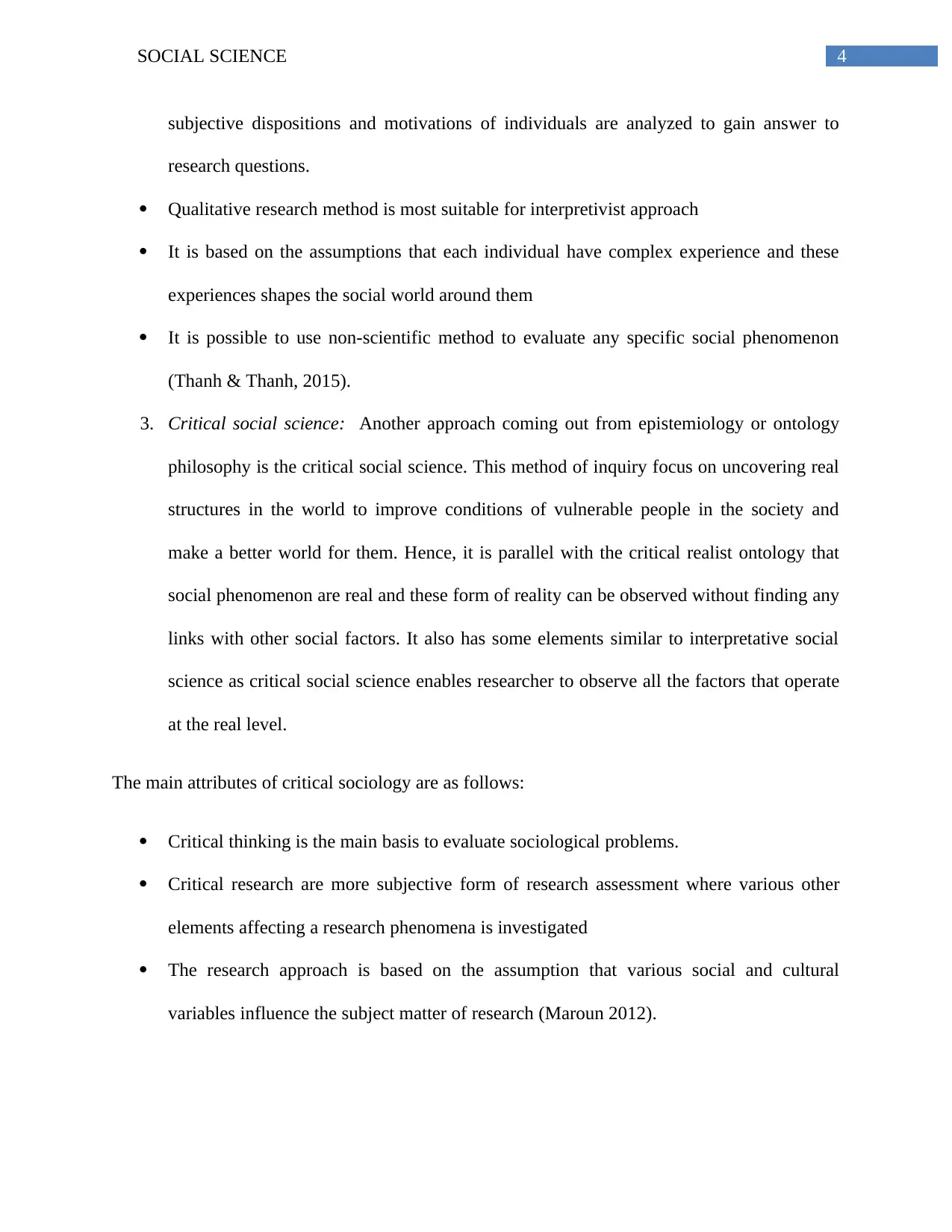
4SOCIAL SCIENCE
subjective dispositions and motivations of individuals are analyzed to gain answer to
research questions.
Qualitative research method is most suitable for interpretivist approach
It is based on the assumptions that each individual have complex experience and these
experiences shapes the social world around them
It is possible to use non-scientific method to evaluate any specific social phenomenon
(Thanh & Thanh, 2015).
3. Critical social science: Another approach coming out from epistemiology or ontology
philosophy is the critical social science. This method of inquiry focus on uncovering real
structures in the world to improve conditions of vulnerable people in the society and
make a better world for them. Hence, it is parallel with the critical realist ontology that
social phenomenon are real and these form of reality can be observed without finding any
links with other social factors. It also has some elements similar to interpretative social
science as critical social science enables researcher to observe all the factors that operate
at the real level.
The main attributes of critical sociology are as follows:
Critical thinking is the main basis to evaluate sociological problems.
Critical research are more subjective form of research assessment where various other
elements affecting a research phenomena is investigated
The research approach is based on the assumption that various social and cultural
variables influence the subject matter of research (Maroun 2012).
subjective dispositions and motivations of individuals are analyzed to gain answer to
research questions.
Qualitative research method is most suitable for interpretivist approach
It is based on the assumptions that each individual have complex experience and these
experiences shapes the social world around them
It is possible to use non-scientific method to evaluate any specific social phenomenon
(Thanh & Thanh, 2015).
3. Critical social science: Another approach coming out from epistemiology or ontology
philosophy is the critical social science. This method of inquiry focus on uncovering real
structures in the world to improve conditions of vulnerable people in the society and
make a better world for them. Hence, it is parallel with the critical realist ontology that
social phenomenon are real and these form of reality can be observed without finding any
links with other social factors. It also has some elements similar to interpretative social
science as critical social science enables researcher to observe all the factors that operate
at the real level.
The main attributes of critical sociology are as follows:
Critical thinking is the main basis to evaluate sociological problems.
Critical research are more subjective form of research assessment where various other
elements affecting a research phenomena is investigated
The research approach is based on the assumption that various social and cultural
variables influence the subject matter of research (Maroun 2012).
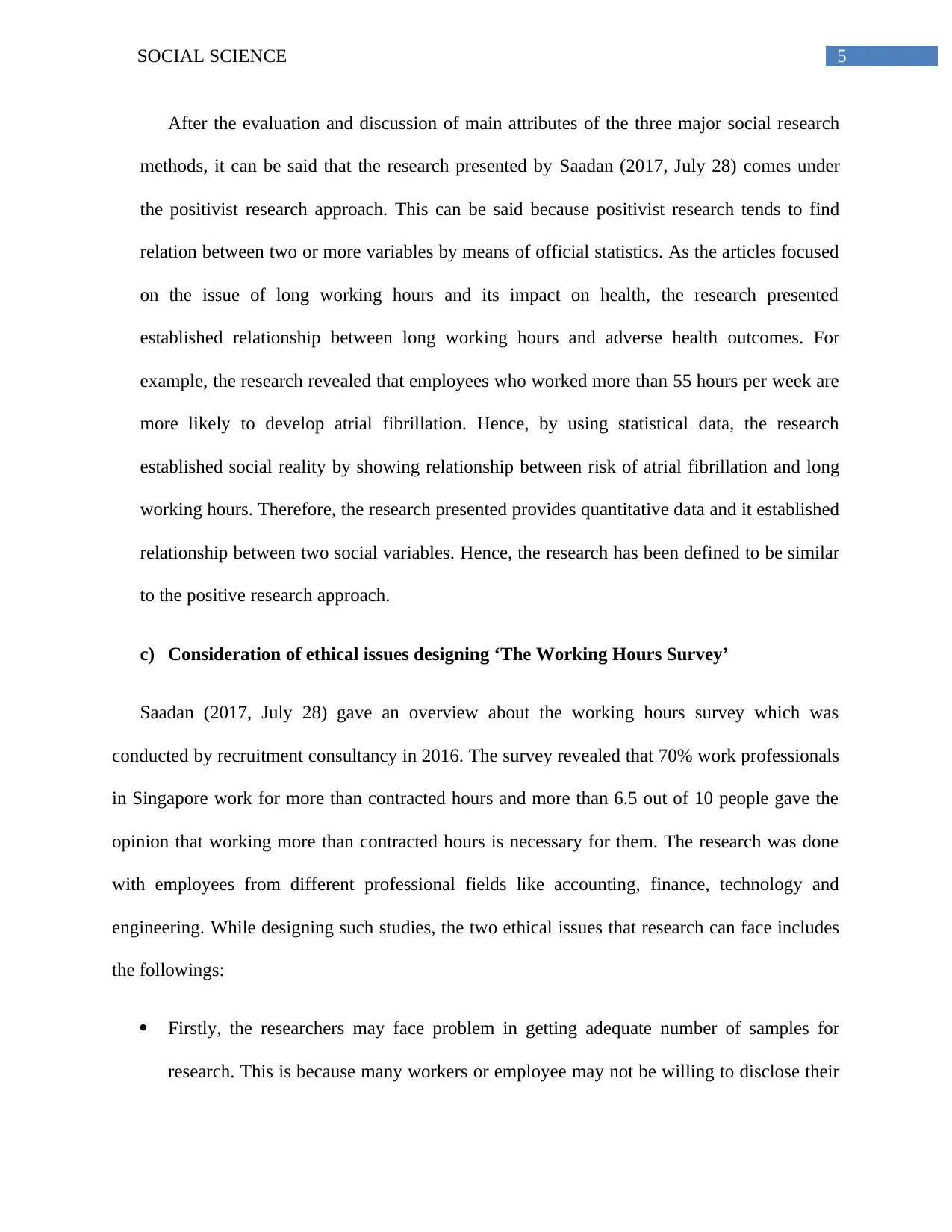
5SOCIAL SCIENCE
After the evaluation and discussion of main attributes of the three major social research
methods, it can be said that the research presented by Saadan (2017, July 28) comes under
the positivist research approach. This can be said because positivist research tends to find
relation between two or more variables by means of official statistics. As the articles focused
on the issue of long working hours and its impact on health, the research presented
established relationship between long working hours and adverse health outcomes. For
example, the research revealed that employees who worked more than 55 hours per week are
more likely to develop atrial fibrillation. Hence, by using statistical data, the research
established social reality by showing relationship between risk of atrial fibrillation and long
working hours. Therefore, the research presented provides quantitative data and it established
relationship between two social variables. Hence, the research has been defined to be similar
to the positive research approach.
c) Consideration of ethical issues designing ‘The Working Hours Survey’
Saadan (2017, July 28) gave an overview about the working hours survey which was
conducted by recruitment consultancy in 2016. The survey revealed that 70% work professionals
in Singapore work for more than contracted hours and more than 6.5 out of 10 people gave the
opinion that working more than contracted hours is necessary for them. The research was done
with employees from different professional fields like accounting, finance, technology and
engineering. While designing such studies, the two ethical issues that research can face includes
the followings:
Firstly, the researchers may face problem in getting adequate number of samples for
research. This is because many workers or employee may not be willing to disclose their
After the evaluation and discussion of main attributes of the three major social research
methods, it can be said that the research presented by Saadan (2017, July 28) comes under
the positivist research approach. This can be said because positivist research tends to find
relation between two or more variables by means of official statistics. As the articles focused
on the issue of long working hours and its impact on health, the research presented
established relationship between long working hours and adverse health outcomes. For
example, the research revealed that employees who worked more than 55 hours per week are
more likely to develop atrial fibrillation. Hence, by using statistical data, the research
established social reality by showing relationship between risk of atrial fibrillation and long
working hours. Therefore, the research presented provides quantitative data and it established
relationship between two social variables. Hence, the research has been defined to be similar
to the positive research approach.
c) Consideration of ethical issues designing ‘The Working Hours Survey’
Saadan (2017, July 28) gave an overview about the working hours survey which was
conducted by recruitment consultancy in 2016. The survey revealed that 70% work professionals
in Singapore work for more than contracted hours and more than 6.5 out of 10 people gave the
opinion that working more than contracted hours is necessary for them. The research was done
with employees from different professional fields like accounting, finance, technology and
engineering. While designing such studies, the two ethical issues that research can face includes
the followings:
Firstly, the researchers may face problem in getting adequate number of samples for
research. This is because many workers or employee may not be willing to disclose their
⊘ This is a preview!⊘
Do you want full access?
Subscribe today to unlock all pages.

Trusted by 1+ million students worldwide
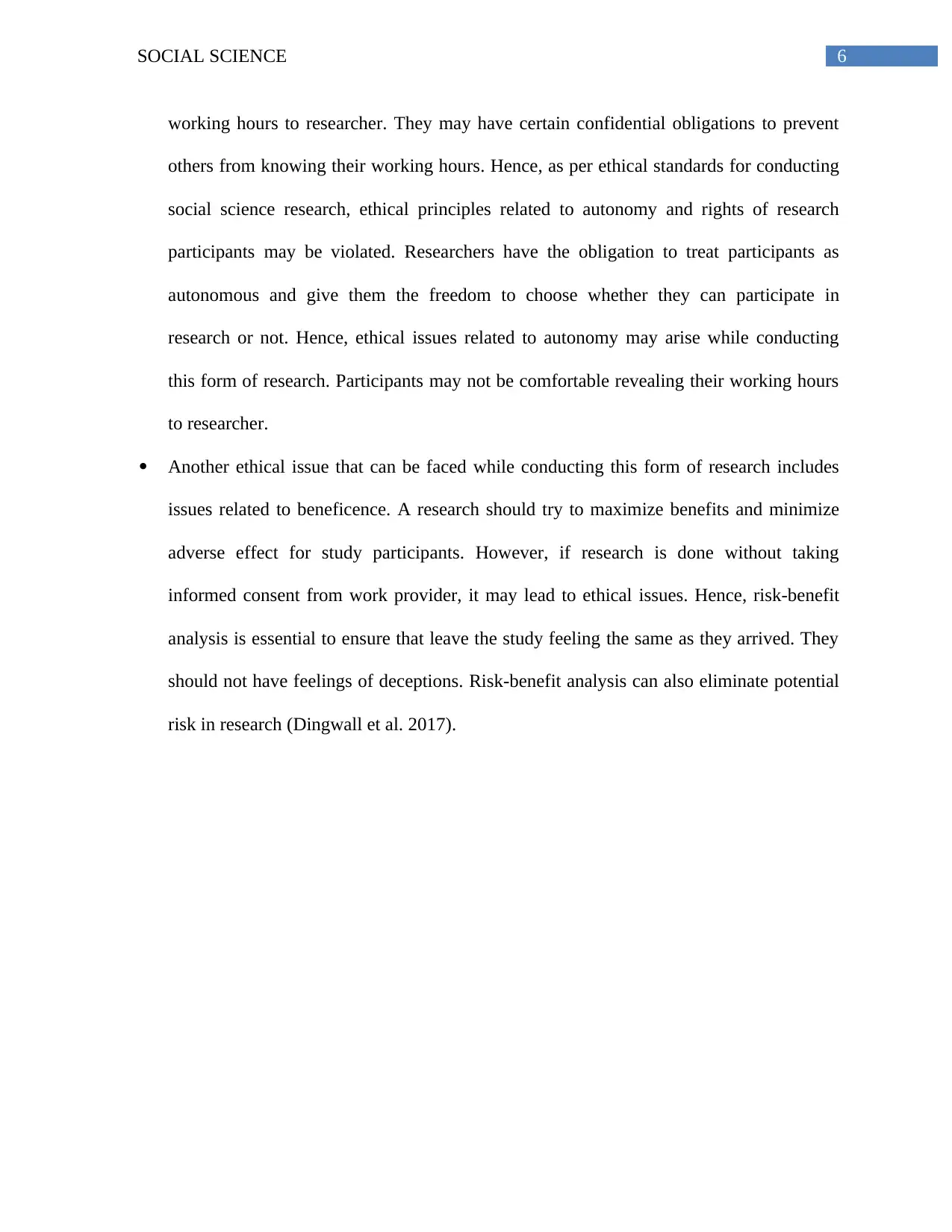
6SOCIAL SCIENCE
working hours to researcher. They may have certain confidential obligations to prevent
others from knowing their working hours. Hence, as per ethical standards for conducting
social science research, ethical principles related to autonomy and rights of research
participants may be violated. Researchers have the obligation to treat participants as
autonomous and give them the freedom to choose whether they can participate in
research or not. Hence, ethical issues related to autonomy may arise while conducting
this form of research. Participants may not be comfortable revealing their working hours
to researcher.
Another ethical issue that can be faced while conducting this form of research includes
issues related to beneficence. A research should try to maximize benefits and minimize
adverse effect for study participants. However, if research is done without taking
informed consent from work provider, it may lead to ethical issues. Hence, risk-benefit
analysis is essential to ensure that leave the study feeling the same as they arrived. They
should not have feelings of deceptions. Risk-benefit analysis can also eliminate potential
risk in research (Dingwall et al. 2017).
working hours to researcher. They may have certain confidential obligations to prevent
others from knowing their working hours. Hence, as per ethical standards for conducting
social science research, ethical principles related to autonomy and rights of research
participants may be violated. Researchers have the obligation to treat participants as
autonomous and give them the freedom to choose whether they can participate in
research or not. Hence, ethical issues related to autonomy may arise while conducting
this form of research. Participants may not be comfortable revealing their working hours
to researcher.
Another ethical issue that can be faced while conducting this form of research includes
issues related to beneficence. A research should try to maximize benefits and minimize
adverse effect for study participants. However, if research is done without taking
informed consent from work provider, it may lead to ethical issues. Hence, risk-benefit
analysis is essential to ensure that leave the study feeling the same as they arrived. They
should not have feelings of deceptions. Risk-benefit analysis can also eliminate potential
risk in research (Dingwall et al. 2017).
Paraphrase This Document
Need a fresh take? Get an instant paraphrase of this document with our AI Paraphraser
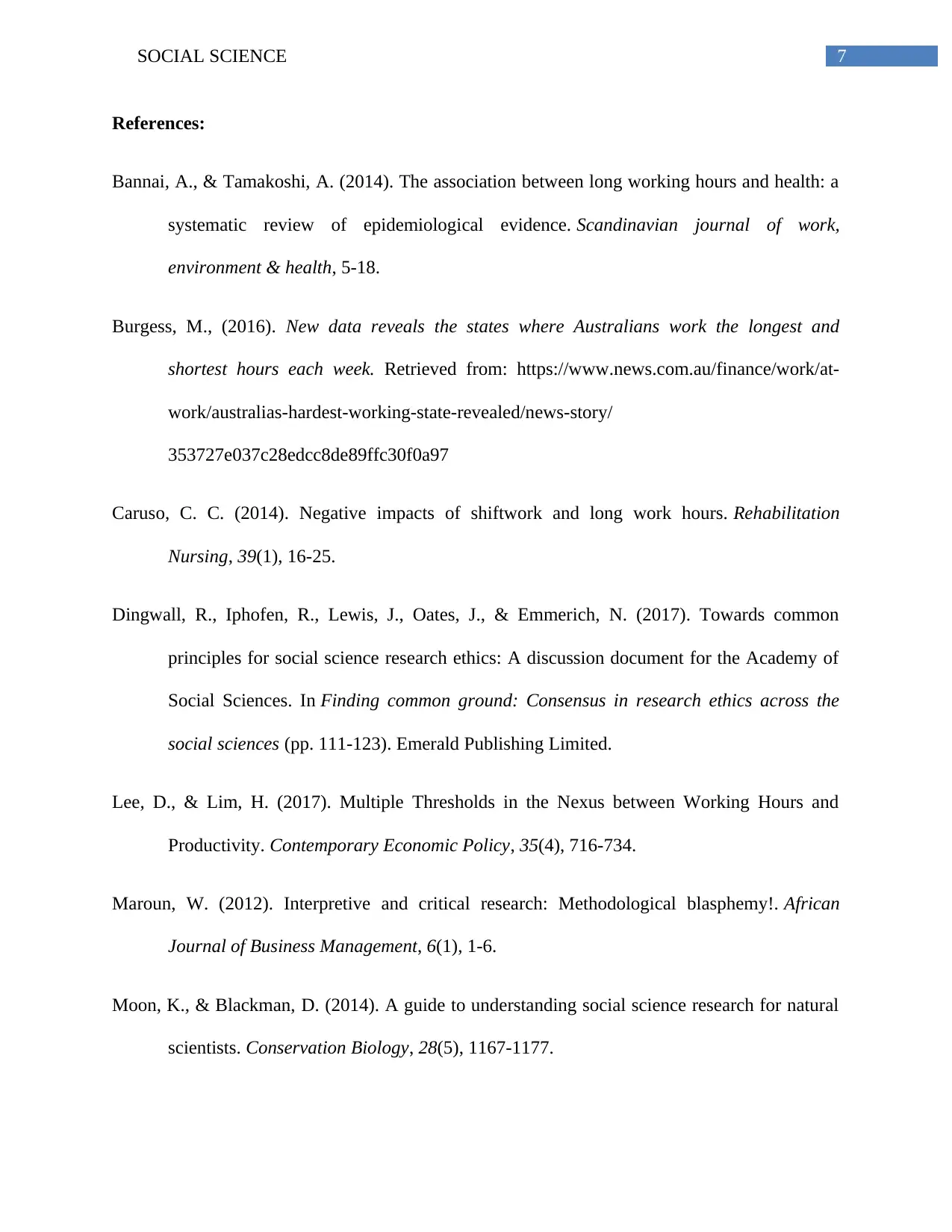
7SOCIAL SCIENCE
References:
Bannai, A., & Tamakoshi, A. (2014). The association between long working hours and health: a
systematic review of epidemiological evidence. Scandinavian journal of work,
environment & health, 5-18.
Burgess, M., (2016). New data reveals the states where Australians work the longest and
shortest hours each week. Retrieved from: https://www.news.com.au/finance/work/at-
work/australias-hardest-working-state-revealed/news-story/
353727e037c28edcc8de89ffc30f0a97
Caruso, C. C. (2014). Negative impacts of shiftwork and long work hours. Rehabilitation
Nursing, 39(1), 16-25.
Dingwall, R., Iphofen, R., Lewis, J., Oates, J., & Emmerich, N. (2017). Towards common
principles for social science research ethics: A discussion document for the Academy of
Social Sciences. In Finding common ground: Consensus in research ethics across the
social sciences (pp. 111-123). Emerald Publishing Limited.
Lee, D., & Lim, H. (2017). Multiple Thresholds in the Nexus between Working Hours and
Productivity. Contemporary Economic Policy, 35(4), 716-734.
Maroun, W. (2012). Interpretive and critical research: Methodological blasphemy!. African
Journal of Business Management, 6(1), 1-6.
Moon, K., & Blackman, D. (2014). A guide to understanding social science research for natural
scientists. Conservation Biology, 28(5), 1167-1177.
References:
Bannai, A., & Tamakoshi, A. (2014). The association between long working hours and health: a
systematic review of epidemiological evidence. Scandinavian journal of work,
environment & health, 5-18.
Burgess, M., (2016). New data reveals the states where Australians work the longest and
shortest hours each week. Retrieved from: https://www.news.com.au/finance/work/at-
work/australias-hardest-working-state-revealed/news-story/
353727e037c28edcc8de89ffc30f0a97
Caruso, C. C. (2014). Negative impacts of shiftwork and long work hours. Rehabilitation
Nursing, 39(1), 16-25.
Dingwall, R., Iphofen, R., Lewis, J., Oates, J., & Emmerich, N. (2017). Towards common
principles for social science research ethics: A discussion document for the Academy of
Social Sciences. In Finding common ground: Consensus in research ethics across the
social sciences (pp. 111-123). Emerald Publishing Limited.
Lee, D., & Lim, H. (2017). Multiple Thresholds in the Nexus between Working Hours and
Productivity. Contemporary Economic Policy, 35(4), 716-734.
Maroun, W. (2012). Interpretive and critical research: Methodological blasphemy!. African
Journal of Business Management, 6(1), 1-6.
Moon, K., & Blackman, D. (2014). A guide to understanding social science research for natural
scientists. Conservation Biology, 28(5), 1167-1177.
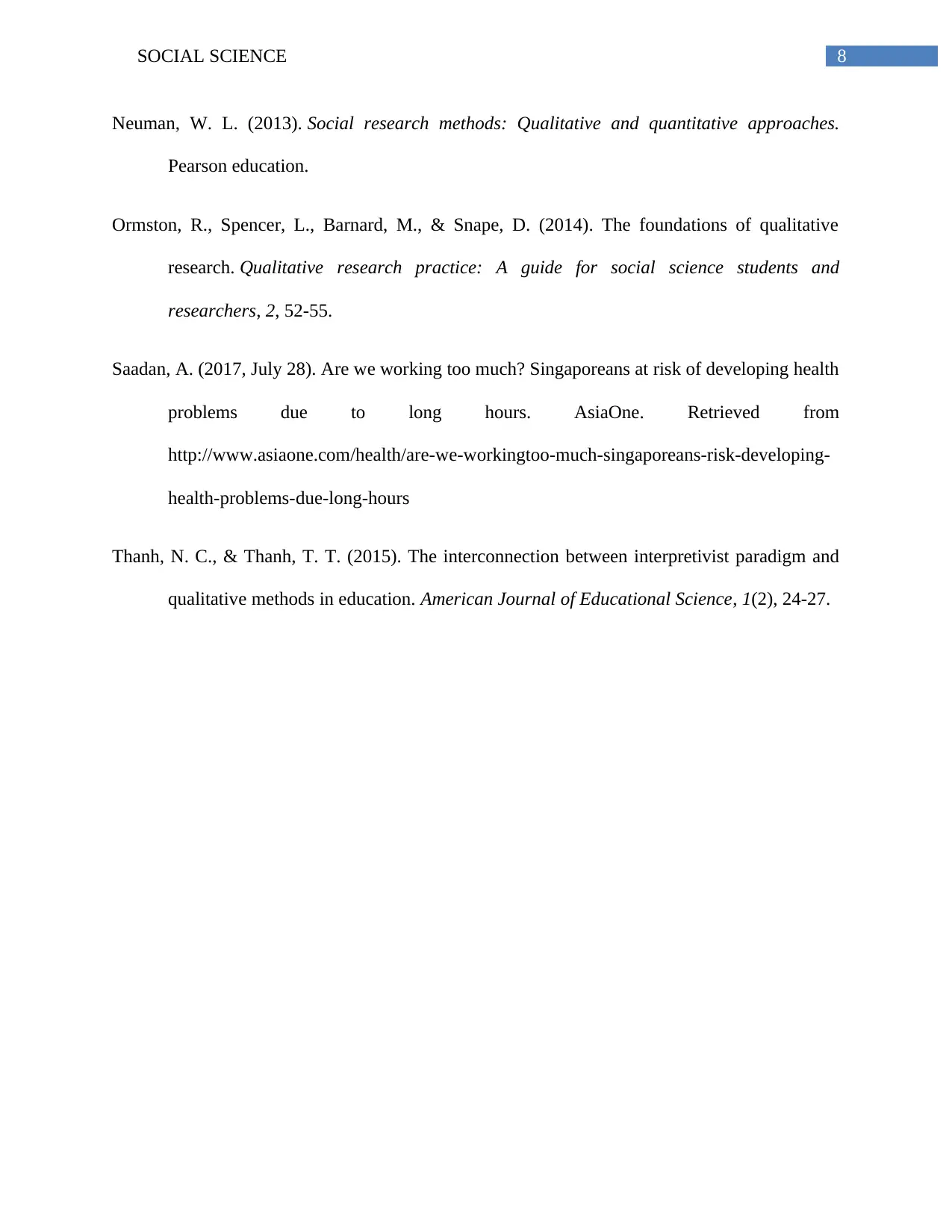
8SOCIAL SCIENCE
Neuman, W. L. (2013). Social research methods: Qualitative and quantitative approaches.
Pearson education.
Ormston, R., Spencer, L., Barnard, M., & Snape, D. (2014). The foundations of qualitative
research. Qualitative research practice: A guide for social science students and
researchers, 2, 52-55.
Saadan, A. (2017, July 28). Are we working too much? Singaporeans at risk of developing health
problems due to long hours. AsiaOne. Retrieved from
http://www.asiaone.com/health/are-we-workingtoo-much-singaporeans-risk-developing-
health-problems-due-long-hours
Thanh, N. C., & Thanh, T. T. (2015). The interconnection between interpretivist paradigm and
qualitative methods in education. American Journal of Educational Science, 1(2), 24-27.
Neuman, W. L. (2013). Social research methods: Qualitative and quantitative approaches.
Pearson education.
Ormston, R., Spencer, L., Barnard, M., & Snape, D. (2014). The foundations of qualitative
research. Qualitative research practice: A guide for social science students and
researchers, 2, 52-55.
Saadan, A. (2017, July 28). Are we working too much? Singaporeans at risk of developing health
problems due to long hours. AsiaOne. Retrieved from
http://www.asiaone.com/health/are-we-workingtoo-much-singaporeans-risk-developing-
health-problems-due-long-hours
Thanh, N. C., & Thanh, T. T. (2015). The interconnection between interpretivist paradigm and
qualitative methods in education. American Journal of Educational Science, 1(2), 24-27.
⊘ This is a preview!⊘
Do you want full access?
Subscribe today to unlock all pages.

Trusted by 1+ million students worldwide
1 out of 9
Related Documents
Your All-in-One AI-Powered Toolkit for Academic Success.
+13062052269
info@desklib.com
Available 24*7 on WhatsApp / Email
![[object Object]](/_next/static/media/star-bottom.7253800d.svg)
Unlock your academic potential
Copyright © 2020–2026 A2Z Services. All Rights Reserved. Developed and managed by ZUCOL.





